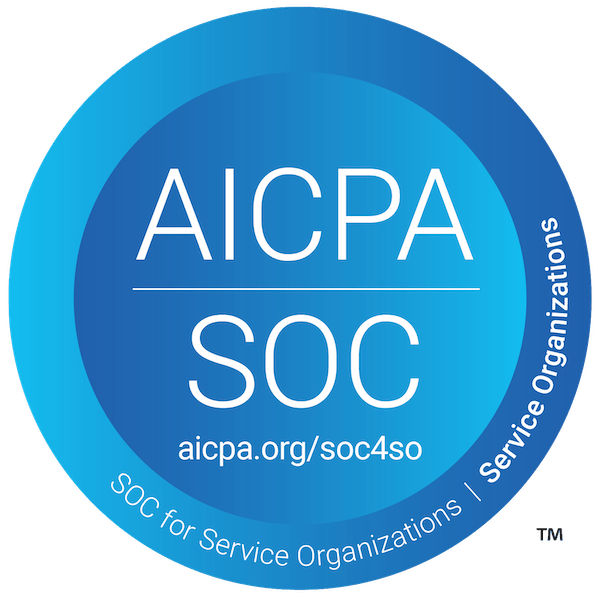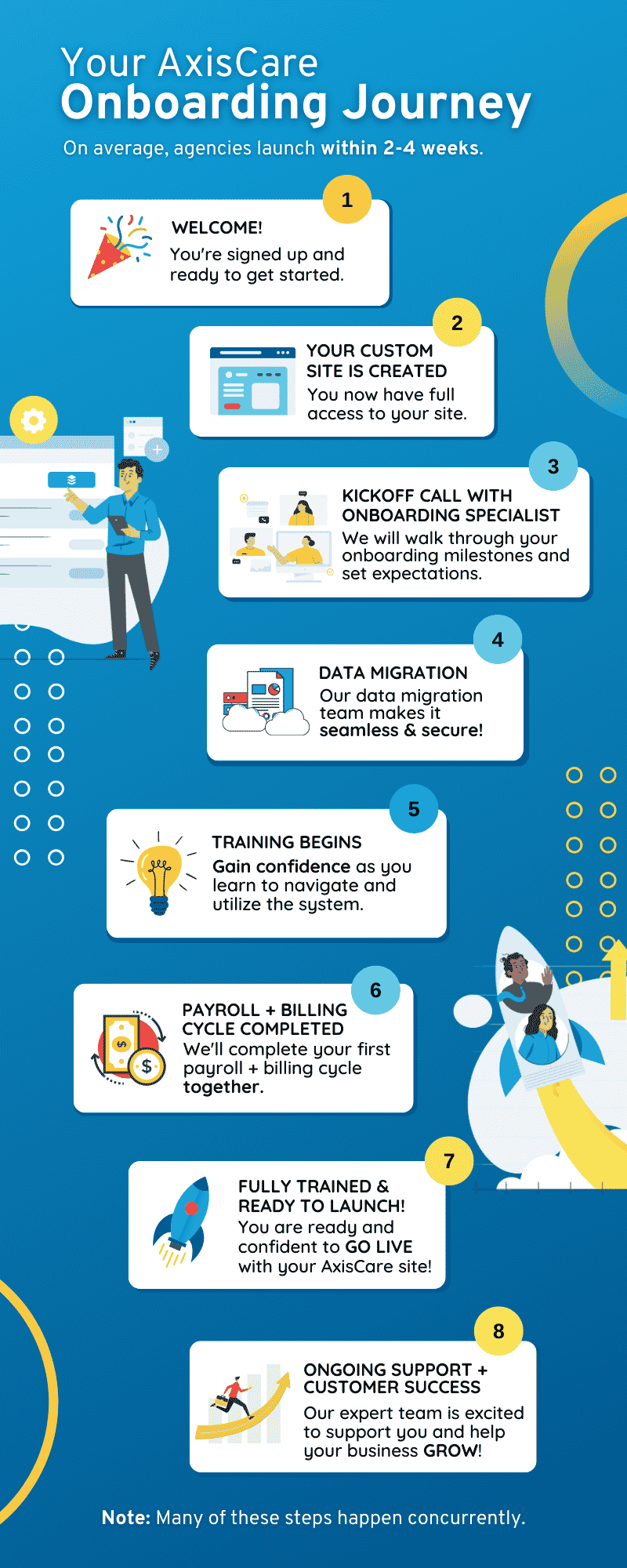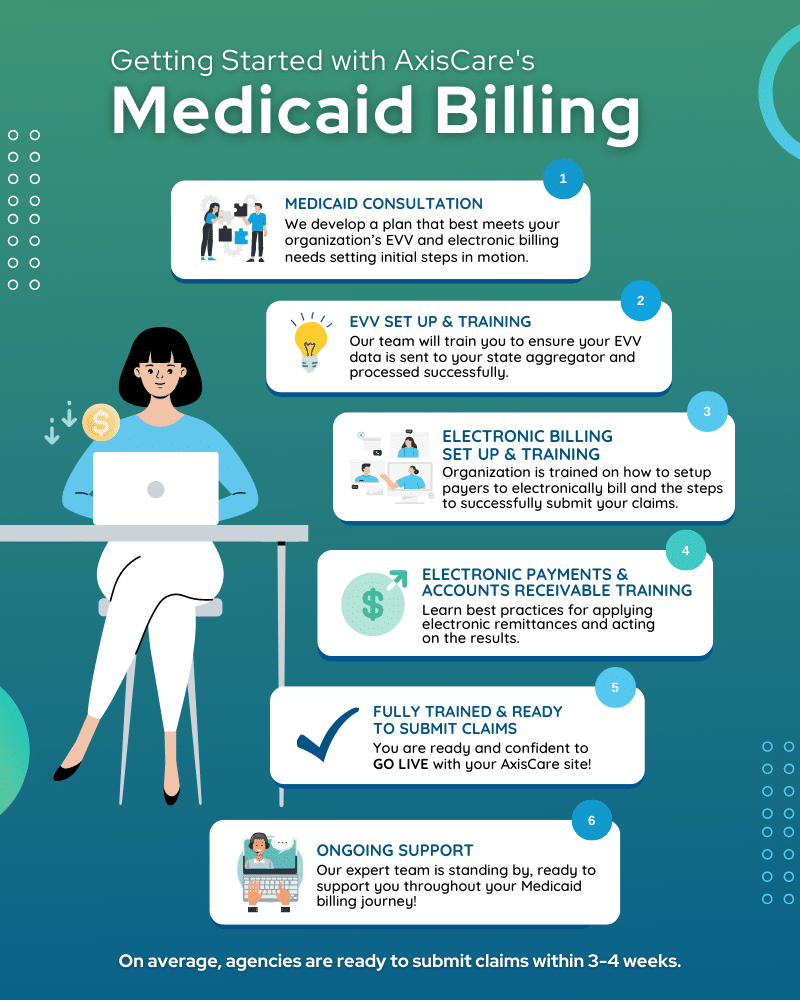In the healthcare industry, staying ahead of the curve is essential to ensure that clients receive the best possible care and that providers remain profitable. Home healthcare agencies, in particular, must constantly innovate and adopt new technologies and strategies to meet the needs of their clients and stay competitive in a rapidly evolving marketplace. By embracing fresh and innovative practices, these agencies can deliver better client outcomes, boost their bottom line, and ultimately thrive in the years to come. Adopting new technologies, trends, and strategies can help streamline operations, improve efficiency, and enhance care delivery, making them a valuable investment for any home healthcare business looking to succeed in the future.
Home Healthcare Industry in the U.S.
The home healthcare industry in the United States plays a vital role in offering medical and personal care services directly to individuals in their homes. This eliminates the need for hospitalization and provides clients with a comfortable and personalized setting. The industry encompasses many services, including skilled nursing, physical therapy, and personal care assistance. Due to an aging population and a growing preference for aging in place, this industry is experiencing significant growth.
Importance of Home Healthcare Services
Home healthcare services play a significant role in providing clients with personalized care in the comfort of their homes, improving their quality of life, and promoting independence. For organizations and the economy, these services reduce hospital readmissions, lead to substantial healthcare cost savings, and create employment opportunities, contributing to the growth of local economies.
Revenue for Home Healthcare Agencies
Home healthcare agencies earn revenue through various sources, such as private pay, insurance reimbursements, and government funding. Below is a further breakdown of the multiple revenue streams for home healthcare agencies.
Medicaid Reimbursement
Medicaid billing is a crucial aspect of the healthcare industry, helping low-income individuals and families access essential healthcare services. However, getting reimbursed for Medicaid billing can be a bit complex. To receive payment, healthcare providers must submit claims for the services provided to Medicaid beneficiaries, which require following state-specific procedures and documentation requirements, including Electronic Visit Verification (EVV).
Electronic Visit Verification EVV is a system that verifies the delivery of in-home services, allowing Medicaid to confirm that services were provided as reported. The AxisCare caregiver mobile app is an example of an EVV system that can help streamline the process of submitting claims and getting paid for services provided. Caregivers can use the app to document the services they provide to Medicaid beneficiaries, such as medication reminders, meal preparation, and personal care.
By using the AxisCare caregiver mobile app, healthcare providers can ensure they meet state-specific requirements for Medicaid billing and documentation, reducing the risk of denied claims and other errors. This, in turn, can help providers get reimbursed more quickly and efficiently, allowing them to focus on delivering essential healthcare services to those who need it most.
Private Insurance
Private insurance plans vary in coverage and reimbursement methods for home healthcare services. Some plans may cover a portion of the expenses, while others may provide comprehensive coverage for the user.
Out-of-Pocket Payments or Private Pay
Home healthcare agencies can attract private-paying clients by offering specialized services, personalized care, or additional amenities. The ability to cater to private-paying clients can diversify revenue sources and reduce the reliance on government reimbursements and claim accuracy and submissions.
Value-Based Care Programs
They may receive financial incentives or bonuses based on meeting certain quality metrics, client satisfaction scores, or cost savings targets.
Veterans Affairs
Home healthcare agencies also generate revenue by providing specialized services to veterans, funded through the Department of Veterans Affairs through a claims process.
Partnerships and Collaborations
Collaborating with hospitals and healthcare systems can lead to referrals, shared resources, and access to a larger client population.
Using Home Health Care Software for Revenue Optimization
Leveraging home care software can substantially optimize revenue for home healthcare agencies. By streamlining revenue cycles, it accelerates billing processes and improves cash flow, thereby driving financial health. The software enhances client care through efficient scheduling, real-time tracking, and personalized care plans, resulting in higher client satisfaction and increased demand for services. Additionally, it supports data-driven decision-making by providing valuable insights into operational efficiencies and areas for improvement, promoting growth and profitability.
Streamlining Operations
Home healthcare software automates and digitizes administrative and operational tasks, improving efficiency and client care while reducing manual effort and errors.
Improving Billing and Reimbursement
Home healthcare software significantly improves billing and reimbursement processes, ensuring accurate and timely claim submissions. The software integrates with billing systems, automates coding, and facilitates electronic claims submission.
Enhancing Client Care and Outcomes
The software provides a centralized platform for storing and managing a client‘s comprehensive medical information. This includes their complete medical history, current care plans, prescribed medications, and real-time vital signs monitoring. The centralization of such information enables healthcare providers to have a more in-depth and holistic understanding of a client‘s health, which ultimately leads to better diagnoses and treatment plans. Additionally, the software promotes continuity of care by allowing all relevant healthcare staff to access a client‘s information seamlessly, regardless of their location, which significantly reduces the risk of medical errors. The transparency of information among staff also leads to better collaboration, which ultimately results in better client outcomes.
Cost Savings and Revenue Generation
By automating manual processes and reducing paperwork, the software minimizes administrative overhead costs and facilitates greater resource allocation.
Leveraging AxisCare’s Solutions
If you’re a home healthcare agency looking to expand your payer source and streamline your operations, AxisCare can help. Our user-friendly software not only simplifies your revenue cycle but also speeds up billing and claim processes. Additionally, it provides real-time insights into your operational efficiency and helps you identify areas for improvement. With AxisCare, you can enhance care delivery, improve client satisfaction, and increase demand for your services, all in one easy-to-use platform.











